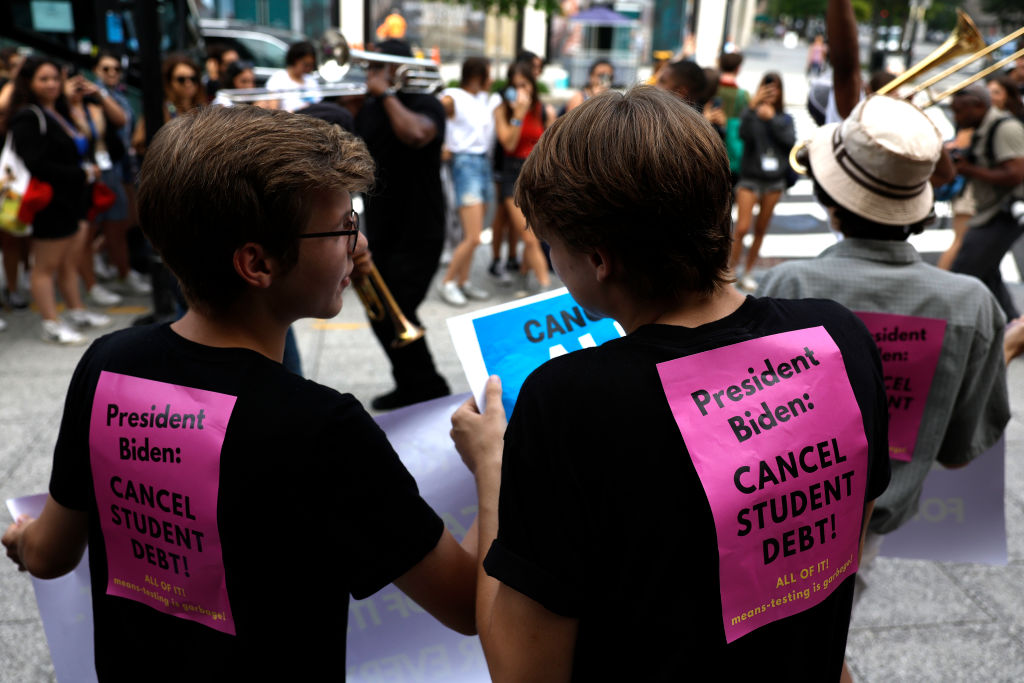
President Biden’s student loan payment pause is set to end in less than two weeks but loan borrowers are wondering whether the pause will be extended for a seventh time. The pause, which first went into effect in March 2020, is set to end on Aug. 31. Although there’s evidence that the pause will see another extension, it’s the closest the pause has come to an end date without being extended again. Many borrowers feel ill-prepared at the prospect of resuming payments with such short notice.
“I don’t think if I had to pay my student loans I would have been able to eat. I’ve been operating, not just paycheck to paycheck, but I’m borrowing money and using credit to pay for basic survival needs,” Victoria Loe, who’s attended several different Virginia colleges, tells TIME. “I haven’t quite processed the fact that that’s something I’m going to have to start paying for. I’ve been working minimum wage for the past couple of years.”
Read More: What We Know So Far About President Biden’s Plan to Forgive Student Loans
In June, U.S. Secretary of Education Miguel Cardona said that borrowers will receive “ample notice” on any decisions regarding loan payments. In July, Biden said that he would share his decision on whether or not to extend the pause by the end of August.
“My rent just went up but I got a new job, so I was really hoping that because I got a pay increase I could start paying off all those debts, actually saving money and working towards improving my financial standing,” Loe says. “But if I have extra few hundred dollar payments that come up every month, all of those goals and intentions that I have are going to fly out the window.”
The student loan payment pause, an initiative through COVID-19 Emergency Relief and Federal Student Aid, began under the Trump administration to alleviate financial burden at the beginning of the pandemic. The pause suspended federal student loan payments serviced by the Department of Education, allowed 0% interest accrual on the loans and halted the collection of defaulted loans.
“The student loan repayment pause program has allowed me to explore more career areas after graduating with a degree in a field that is difficult to secure a well paying job,” Emily Archer, a graduate in health and nutrition studies from University of Massachusetts Amherst’s University Without Walls (UWW) program, tells TIME.
UWW is designed to help non-traditional students complete their degrees. The program allowed Archer to save money by working and taking classes online simultaneously. Archer hopes to work in community health and currently has a job in an AmeriCorps program that helps her pay off her loans. Archer shares that she owes about $15,000 in loans and that her AmeriCorps Education Award is $4,500.
“I do think student loans and paying for college were a major factor in making the decision to find an Americorp program that works with my degree,” Archer says. “The downside is that these programs pay very little in terms of stipends, but at least I will be able to work to improve local communities.”
The student loan payment pause was enacted under the CARES Act, which mandates that loan service providers are required to give borrowers a minimum of six notices beginning at least two months before payments resume. In early August, the Education Department told loan service providers not to send out those notices, The Wall Street Journal reported, indicating that payments probably won’t begin soon.
The President now faces pressure from Democratic lawmakers and voters alike to extend the pause and expand other student loan forgiveness measures. Some speculate that Biden’s student loan policies–or lack thereof–could play a role in the upcoming elections.
Since Biden took office, he’s canceled $32 billion in student loans. That relief has mainly focused on borrowers who attended schools that misled students about financial information, borrowers who have disabilities and those enrolled in the Public Service Loan Forgiveness program.
Republicans and Democrats remain divided over student loan pauses and forgiveness amid soaring inflation and a possible recession. Biden supported canceling $10,000 of federal student loans per borrower during his presidential campaign but shot down canceling $50,000 per borrower, a figure that some Democrats have pushed for.
Higher education expert Mark Kantrowitz previously told TIME that if Biden chose to have student loan payments resume just months before an election it would be “political suicide.” “Other than the political considerations, there is no valid justification for a further extension to the payment pause and interest waiver,” Kantrowitz said.
Read More: How the Student Debt Complex Is Crushing the Next Generation of Americans
On Aug. 18, student loan service provider, Nelnet, sent an email to some of its borrowers saying that their payments would automatically debit on Sept. 1. It’s unclear why this message was sent or how many people received it, but hours later, Nelnet sent a follow-up email telling borrowers to disregard the message and that payments remain paused due to the pandemic.
“Earlier today we emailed you that your student loan payment would be automatically withdrawn from your bank account on September 1, 2022,” Nelnet’s clarification email read. “Please disregard that email. It shouldn’t have been sent. We apologize for any confusion or concern it may have caused you.”
The Nelnet emails highlight some of the confusion that loan borrowers are experiencing from miscommunication and a lack of information from administrations and loan service groups.
More Must-Reads from TIME
- Inside Elon Musk’s War on Washington
- Meet the 2025 Women of the Year
- The Harsh Truth About Disability Inclusion
- Why Do More Young Adults Have Cancer?
- Colman Domingo Leads With Radical Love
- How to Get Better at Doing Things Alone
- Cecily Strong on Goober the Clown
- Column: The Rise of America’s Broligarchy
Contact us at letters@time.com